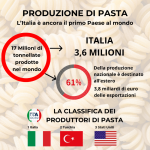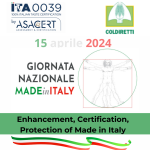Nutrients – a peer-reviewed scientific journal that questions all aspects of nutrition and is published by MDPI (Multidisciplinary Digital Publishing Institute) – recently published a research on the effects of the Mediterranean diet on fatty acids in patients with coronary heart disease.
The RISMeD (Randomized Interventional Study on Mediterranean Diet) study carried out this research between 2015 and 2018, recruiting, through a randomized choice, 130 Italian patients aged between 30 and 75 years, mainly male, almost all overweight and with fairly controlled cholesterol and blood pressure. After a series of interviews and questionnaires, the selected patients were randomly divided into two groups: a group of 64 patients was assigned to the Mediterranean Diet, a second group of 66 patients would have had to follow a standard control diet for coronary heart disease patients.
For two months, those who followed a Mediterranean diet received a program comprising on average: fish at least 3 times a week, legumes 2-3 times a week, raw or cooked vegetables 2 times a day, fruit 3 times. a day, walnuts 2-3 times a week, extra virgin olive oil 30-40 milliliters a day, no more than 150 g per week of red meat, red wine with meals. The diet program of the second group was rich in vegetables, fruits, whole grains and low in saturated fat. The two dietary interventions differed mainly in the greater quantities of fish, legumes and nuts.
The research found that a greater decrease in palmitic acid – one of the most dangerous saturated fatty acids for our cardiovascular system – occurred in patients who were following the Mediterranean diet program. However, the most evident change is that related to the levels of Omega3 with the Mediterranean diet (about 5%). To explain these results, the answer must be found in the intake of fish and nuts, in a considerably greater presence in the Mediterranean diet.
What conclusions can we draw from this research? First and, without a doubt, two confirmations. The first is that the inclusion of the Mediterranean Diet in the List of Intangible Cultural Heritage of Humanity by Unesco is deserved, undeniably.
The second, on the other hand, confirms the effectiveness of the diet not only as a health regime, but as a lifestyle. This regime prefers conviviality, sharing, local and seasonal products, without excluding anything.
However, our habits of life marked by a fast, dynamic, agitated approach, are not always compatible with an eating style which, on the contrary, often requires us to stop and savor the simple and healthy ones.

Yet the COVID-19 pandemic has shown how the needs of Italians are changing. It seems that a side effect that developed following the lockdown was the rediscovery by Italians of an attention to the green: in fact, there has been an increase in purchases at shops that promote sustainable products or at those companies that have proven to have at heart their employees.
This newfound love for sustainability brings with it numerous benefits for the world of “organic” which has been receiving more and more awards for some time and every day. Attention to purchases means, in fact, attention to the labels and the origin of the products. Just as paying attention to companies means choosing also, and above all, local ones, supporting the local economy. In short, it seems that the Mediterranean diet is finally finding open doors and no more walls to break through.
More than the Mediterranean diet, it is Italian food that is the true representative of a better lifestyle, which begins right at the table. True Italian products, in their genuineness, are among the most effective disseminators of the culture of healthiness. The Italian food and wine heritage, which ITA0039 preserves and disseminates, has no equal in the world. Italy is a set of dialects, traditions, values and cultures that survive the passage of time. Making sustainable choices, choosing foods that help us keep our immune system healthy, as only Made in Italy agri-food products can do, means contributing to the conservation and dissemination of a cultural heritage that has no equal in the world: not only in terms of history, but – as research has shown – also in terms of well-being.
With the help of partners and its Network, the ITA0039 | 100% Italian Taste has become a recognizability and authenticity tool, but it is also an expression of values such as honesty, wholesomeness and transparency, guaranteeing the choices of all admirers and loyal consumers who welcome the real Made in Italy into their homes every day.
ITA0039 looks with enthusiasm at the journey towards sustainability and the spread of the Mediterranean diet, which seems to become less impervious every day, thanks to the incessant work of spreading the awareness that the Certification Protocol has created, a fundamental tool for spreading the importance of taking care of ourselves and of our health, starting with the way in which we decide to fill the shopping cart and the choice we make when we want to go to restaurants in every country in the world.






